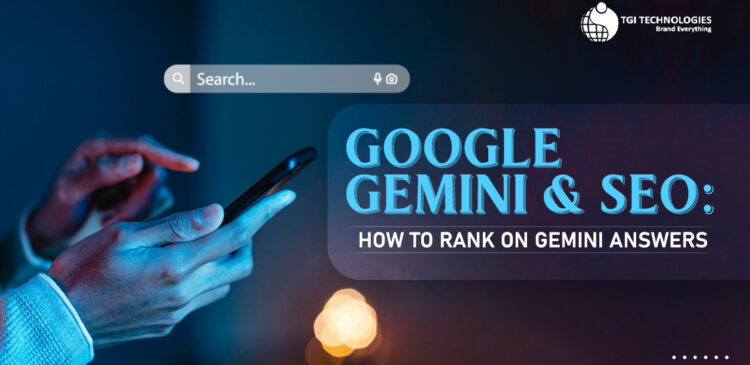Google Gemini & SEO: How to Rank On Gemini Answers

Google Gemini is Google’s next-generation artificial intelligence model, now deeply integrated into the Search Generative Experience (SGE). It has transformed search from a simple list of clickable blue links into a smart, conversational assistant that delivers instant, AI-generated responses. Instead of sending users to multiple websites to find their answers, Gemini summarises the most relevant information and often cites a few trusted sources directly in its generated text. This shift is rewriting the rules of SEO. Being on page one is no longer the only goal—brands must now position themselves to be selected and quoted by Google Gemini & SEO.
This is where two important strategies—Answer Engine Optimization (AEO) and Generative Engine Optimization (GEO)—come into play.
AEO focuses on crafting content that is easy for AI systems to interpret, trustworthy in tone, and highly relevant to a specific query. GEO takes this further by structuring and presenting information in a way that appeals specifically to generative AI algorithms, helping them decide that your content is the most suitable source. As more and more searches end with a “zero-click” experience—where users get what they need without visiting another page—brands must work harder to build citational authority. In other words, you want Gemini to see your business as the definitive answer for your niche.
Ranking in Gemini’s answers still relies on the foundation of traditional SEO.
A fast-loading website, mobile optimisation, secure HTTPS protocols, and a clean, intuitive navigation structure are non-negotiables. Backlinks from reputable websites still matter because they help Google’s algorithms confirm your site’s authority. However, to truly appeal to Gemini, content must match the way real people speak and search. Phrasing like “Where can I find the best digital marketing services in Sydney, Australia?” or “Which digital marketing agency in Perth, Australia, delivers measurable ROI?” reflects natural search behaviour and can help AI engines connect your content with relevant user queries.
Content clarity is another critical factor.
AI tools prefer information that is well-organised and easy to scan. Even though your blog might be long, it should still be broken into short, coherent paragraphs that focus on one idea at a time. Incorporating FAQ sections is especially effective because it mirrors the question-and-answer structure that Gemini naturally uses. For example, if someone asks, “How do I choose the best digital marketing agency in Sydney, Australia?” having a dedicated section answering that question increases your chances of being cited.
Structured data, also known as schema markup, is a valuable tool.
Adding LocalBusiness, Service, and FAQ schema tells AI exactly what your business offers, where it operates, and the type of queries you can answer. If you run a digital marketing agency in Perth, Australia, for example, schema markup could help Gemini identify you as a local expert when someone searches for marketing solutions in that region. This level of clarity gives you an edge over competitors who rely only on traditional keyword optimisation.
Equally important is demonstrating trust and expertise.
Google’s E-E-A-T guidelines—Experience, Expertise, Authoritativeness, and Trustworthiness—apply just as much to AI search as they do to traditional SEO. You should display credentials, showcase client testimonials, publish case studies, and highlight industry awards. For example, if your agency has helped small businesses in Sydney achieve a 200% increase in online leads, this is the type of evidence that not only convinces potential clients but also signals to AI that your brand is credible and results-driven.
Keeping your content fresh is another often-overlooked factor.
AI models like Gemini value up-to-date information because it ensures accuracy. Service pages should be reviewed and updated regularly, blogs should reflect the latest industry trends, and local market changes should be addressed promptly. For instance, if new advertising tools become available for Australian businesses, agencies in both Sydney and Perth should update their content to reflect this, demonstrating expertise and relevance.
The real key to ranking in Google Gemini’s answers lies in blending traditional SEO with AI-focused optimisation.
Your content must be technically sound, user-friendly, and AI-ready. That means writing in a natural voice, structuring content so it’s easy for AI to extract relevant sections, implementing schema markup for clarity, and consistently proving your authority through high-quality, evidence-backed information. Whether your goal is to promote the best digital marketing services in Sydney, Australia, expand the reach of your digital marketing agency in Perth, Australia, or stand out as a leading digital marketing agency in Sydney, Australia, the principles remain the same. Gemini’s AI-driven search is shaping the future of online visibility, and the businesses that adapt early will not just be found—they will be the answers people see first.

